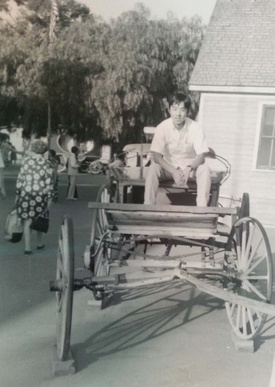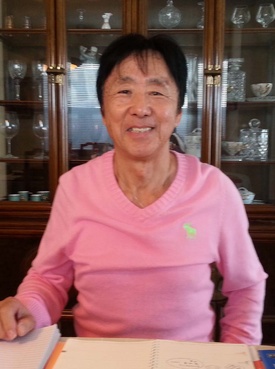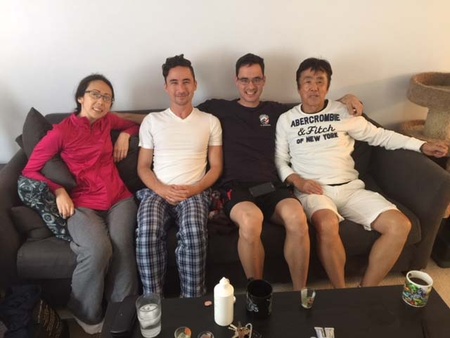Throw away your pride as a college graduate and start from scratch
We often hear of Shin-Issei returning to Japan after retirement these days. Some say the reason is that medical costs are so high in America that they cannot spend their retirement years in peace. Even among people who have lived their lives using English, some say, "Japanese is better for medical and technical terms. In Japan, there is no need to worry about language," while others say, "After all, Japan is better, where my family is around me and I can eat delicious Japanese food."
I am interested in why the Shin-Issei came to America, what they gained while they were there, and what their reasons are if they choose to remain in America after retirement. I spoke to Yasuo Niiro, whom I met through the activities of the Oita Prefectural Association, of which I am a member, about this topic.
Niiro was born in Yokohama, Kanagawa Prefecture in 1949. His father was a pastor and a doctor, and his mother was a nurse. He was the youngest of two older brothers and three older sisters. His parents went to China during World War II and served to help leprosy patients. After returning to Japan, they built a clinic and church in Yokohama, where Niiro and his older sister were born.
Being from Yokohama, the Niiro family had contact with Americans. Niiro's eldest brother, Tokitomo, was sponsored by an American acquaintance and crossed the ocean on the Hikawa Maru to study at a university. Niiro himself failed the entrance exam to medical school and gave up on his dream of becoming a doctor. However, his father suggested that he "see the wider world for once," and he decided to go to America to be with his brother.
"It was July 1969. I flew to Hawaii and then got on another plane to the mainland."
However, since he had obtained a green card at the U.S. Embassy in Tokyo before going to the U.S., he realized that there was a risk of being drafted in the U.S. during the Vietnam War. On his brother's advice, he immediately returned to Japan. In Japan, he enrolled in Kanto Gakuin University and graduated from the Department of Electrical Engineering.
"I returned to the United States in April 1974. My first jobs were as a dishwasher and waiter. I'm still grateful to my brother for telling me, 'Even though you may have graduated from university in Japan, here you have to put aside your pride and start from scratch.'"
After helping out his brother in his jewelry store in Washington, DC, he drove to Seattle, where he had friends, in a car he bought for $300. In Seattle, he worked manual labor at a gas station, in greenhouse farming, and as a butcher. In 1976, he moved to Los Angeles, where his two older sisters lived.
"I was looking at the Rafu Shimpo newspaper when I saw a recruitment advert from a Japanese company. I thought it was a travel agency so I went for an interview, but it turned out to be a logistics company. I started out as a part-time worker in a warehouse. Then they asked me to work in sales, and then I became a sales manager. I ended up working for the company for 31 years."
During that time he experienced marriage and divorce. He had an eldest daughter with his first wife, who is of Greek descent, and had two sons with his second wife, who is of Irish descent. Niiro recalls that he struggled to gain the understanding of his non-Japanese spouse, due to the cultural gap between the two. "When you work for a Japanese company, you're often called upon to play golf on the weekends for business purposes, and it was hard to get them to understand that you don't have enough time to spend with your family. Also, I turned down transfers out of consideration for my family, so in the end my promotions were halted. I don't hold any grudges or anything, but it was really difficult to balance my life between an American family and a Japanese company."
After being detained at the Immigration Bureau, he decided to obtain U.S. citizenship
Niiro-san retired from his job at a logistics company in 2011, and the following year started a new life as a sales representative for the Los Angeles area of Japan's Yabu Shuzo Brewery. Niiro-san and I met at a prefectural association, as the company was based in Oita Prefecture. Niiro-san had already been living in the United States for nearly 50 years at that time, so I asked him what he had gained from living in this country.
"America gave me freedom and I was able to live without any restrictions."
After President Trump took office, Niiro, who had held green card status for many years, obtained citizenship. "In 2015, after visiting Jordan for church purposes, I was detained by immigration officials at Los Angeles Airport for several hours. I was questioned as to why I had gone to such a dangerous country even though I had green card status. After that, I consulted a lawyer, who advised me to obtain citizenship because there was a possibility that such incidents would occur even more if President Trump became president, so I went ahead and did so."
But is there no option but to return to Japan? "If I can't afford the high medical costs (in America), I may have to go to Japan, but for now I intend to stay in America." The way Niiro says "going to Japan" makes it clear that he has no intention of "returning."
I also asked him what he thought would have happened to him if he had returned to Japan (during the Vietnam War) at the beginning and never come to America.
"I think that my selfishness would have crushed me in Japanese society. If I hadn't lived in America, I wouldn't have become someone with a broad worldview. I don't know how many years I have left to live, but I want to give back to America, even if just a little. If I can, I would like to help people in need, and I also want to give back to my older brothers and sisters in America."
During the hour or so that we spent together, two Japanese acquaintances came to visit Niiro. Niiro says that he is proactive in helping out by storing their luggage and helping them with paperwork. It is not just about giving back to those who have directly helped him, but also about extending a helping hand to the new generation coming to America. This is because those who have received help will, when they have lived in America for a while, then try to help the next generation.
Niiro-san will be 70 in two years, but he works out hard every day and studies the Bible. I hope he will continue to stay healthy and act as a bridge between Japan and the U.S. and between generations.
© 2018 Keiko Fukuda








